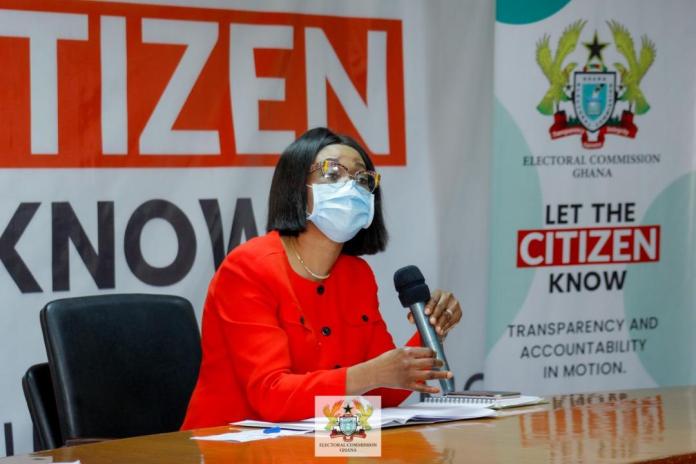|
Getting your Trinity Audio player ready...
|
The Jean Mensa-led Electoral Commission has conducted the most successful general elections in Ghana’s history.
That’s according to a Director for Training at the Commission, Michael Boadu, who attributed the success to their choice of procurement method, reported citinewsroom.com.
At an ongoing post-election event held by the Coalition of Domestic Election Observers (CODEO) the EC official also disclosed that they reduced the amount they spent on each person they employed for the election by 50%, despite acquiring the services of more people than they had in 2016.
“For the first time, the ballot papers, BVDs, and the voter registers were sent to the districts two weeks before the election day, as against the past where they get to their destinations a day to the election.”
Mr. Boadu also noted that their expenditure for the elections was inflated by the COVID-19 pandemic, as the Commission had to procure PPE for its staff.
“With the exception of the printing of the ballot papers which has security implications and the production of TV and radio adverts, all other procurements were done openly through the newspapers. It is important to emphasise that the COVID-19 pandemic affected the cost of the elections, in that we purchased face masks for some 240,000 staff, and also got them other PPE.”
“Again, as a result of the COVID-19 pandemic, most of our offshore items which had to be transported by air had a further hike in prices from what was paid in 2012, 2016. In 2020, the Commission paid full tax on all its offshore items. This notwithstanding, we managed to reduce the cost of the election by almost half the 2016 amount.”
“It is thus indisputable that the 2020 parliamentary and presidential elections were the most successful, well-coordinated, efficient, and the most peaceful election organised in the 4th Republic of Ghana,” Mr. Boadu added.
He indicated that the election management body will not rest on its oars, adding that it is committed to “improving on our service delivery to the good people of Ghana.”
Mr. Boadu also noted that their expenditure for the elections was inflated by the COVID-19 pandemic, as the Commission had to procure PPE for its staff.
“With the exception of the printing of the ballot papers which has security implications and the production of TV and radio adverts, all other procurements were done openly through the newspapers. It is important to emphasise that the COVID-19 pandemic affected the cost of the elections, in that we purchased face masks for some 240,000 staff, and also got them other PPE.”
“Again, as a result of the COVID-19 pandemic, most of our offshore items which had to be transported by air had a further hike in prices from what was paid in 2012, 2016. In 2020, the Commission paid full tax on all its offshore items. This notwithstanding, we managed to reduce the cost of the election by almost half the 2016 amount.”
“It is thus indisputable that the 2020 parliamentary and presidential elections were the most successful, well-coordinated, efficient, and the most peaceful election organised in the 4th Republic of Ghana,” Mr. Boadu added.
He indicated that the election management body will not rest on its oars, adding that it is committed to “improving on our service delivery to the good people of Ghana.”
But the opposition, National Democratic Congress (NDC) has a different view on the performance of the election management body.
The NDC, after boycotting an Inter-Party Advisory Committee (IPAC) meeting set to review the December 7 general elections, described the EC as biased.
“It is the considered view of the NDC that the current leadership of the Electoral Commission who supervised the manipulation of the 2020 general elections and the stolen verdict that resulted from same, lack the integrity, credibility, and impartiality to lead any such discussions or review of the very elections they rigged,” it said in a statement.
The party added that going forward, it will review its relationship with the Commission.
Source: Daily Mail GH with additional files from CNR





